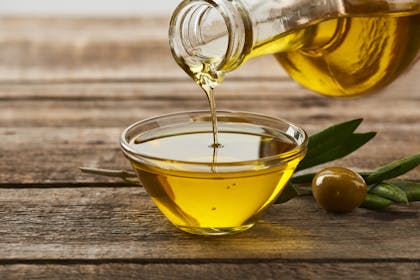Can babies have olive oil?

Find out when it’s safe for your baby to have olive oil, how to introduce it to your baby’s diet, and whether olive oil can help ease constipation for babies
This page contains affiliate links, which means we may earn a small amount of money if a reader clicks through and makes a purchase. All our articles and reviews are written independently by the Netmums editorial team.
The official advice on when babies can have olive oil
According to the NHS, it’s safe to give your baby olive oil from around six months, when you start to wean them onto solid foods.
It's safest to wait until around six months before giving your baby any solid food, because younger babies may not be able to sit up and swallow well.
Olive oil is a great source of fat, which is essential for helping your baby grow and develop in the early months. The NHS emphasises that healthy fats are an important source of energy for babies.
FREE NEWBORN NAPPIES
How to introduce olive oil to your baby
It's best not to introduce olive oil on its own, but instead to use it in cooking, or as a drizzle on salads.
Olive oil is suitable both for spoon feeding and for baby-led weaning.
If you are spoon feeding, you will puree or mash food and feed it to your baby. Baby-led weaning is where you give your baby finger foods to feed themselves.
Neither method is superior to the other, according to the NHS, although giving your baby finger foods will help them to develop their hand-eye coordination.

A good rule of thumb is to start out using olive oil to cook food that your baby has tried before.
If you are spoon feeding, that might mean mixing olive oil into a vegetable puree or using it to cook a meaty bolognese.
Or, for baby-led weaning, you could try drizzling some olive oil over finger food like asparagus, or dipping small pieces of bread.
Health benefits of olive oil for babies
The type of fat found in olive oil is mostly polyunsaturated fat, which is considered a healthy fat.
You don’t need to worry about limiting saturated fats for your baby – half of the fatty acids in breast milk are saturated. In fact, developing a taste for olive oil early will make it more likely that your child will develop healthy eating habits later.
Olive oil can also be a good source of:
- vitamin E (for strengthening the immune system and healthy skin and eyes)
- vitamin K (for helping wounds to heal)
- omega-3 fatty acids (for a healthy heart)
Can olive oil relieve constipation for babies?
There is no clinical evidence that olive oil relieves constipation in babies and young children.
According to United European Gastroenterology, olive oil mainly contains triglycerides, which are absorbed by the small intestine. That means that olive oil does not reach your baby's colon, where it would have the desired laxative effect.
If your baby is suffering from constipation, the NHS recommends that you make sure they are drinking plenty of fluids and eating enough high fibre food.
Could my baby have an olive oil allergy?
Allergic reactions to olive oil, or olive fruit, are very rare although they are possible, according to the American College of Allergy, Asthma & Immunology.
If your baby is allergic to olives then there is a small possibility that they will be allergic to olive oil too, although that chance is slim.
It's a good idea to introduce foods that can cause an allergy one at a time, with several days between them. That way, if your baby does have a reaction, you'll know which food caused it.
According to the NHS, the main foods that can cause an allergy are:
- cows' milk
- eggs
- foods that contain gluten, including wheat, barley and rye
- nuts and peanuts (serve them crushed or ground)
- seeds (serve them crushed or ground)
- soya
- shellfish (don't serve raw or lightly cooked)
- fish
So try to avoid giving any of these other foods at the same time as you give your baby olive oil for the first time.
Signs of allergies in babies
If your baby does have an allergy, you'll probably notice one or more of the following symptoms:
- diarrhoea or vomiting
- a cough
- wheezing and shortness of breath
- itchy throat and tongue
- itchy skin or rash
- swollen lips and throat
- runny or blocked nose
- sore, red and itchy eyes
If you think your baby may have an allergy, speak to your health visitor or GP. If the reaction is mild, don't cut important foods out of your baby's diet until you've received medical advice, as your baby could miss out on important nutrients.
Less commonly, olive oil can cause a severe allergic reaction known as anaphylaxis, which can be life-threatening. If your baby has trouble breathing, or loses consciousness, call 999 for an ambulance straight away and tell them that you think it could be anaphylaxis.
Olive oil recipes for babies
- Butternut squash puree for babies
- Hummus without tahini
- Mini moussakas
- Baby bolognese
- Chicken & apple balls
Need advice?
Our health visitors and nursery nurses are on line Monday to Friday evenings to answer your queries on feeding, sleep and child health.
Looking for more tips on feeding your baby? Check out our articles below, or swap tips and meal ideas with other parents in our forum.


